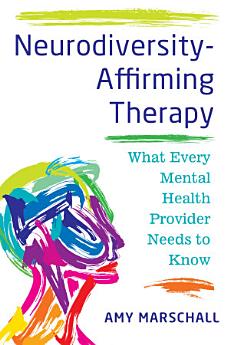Neurodiversity-Affirming Therapy: What Every Mental Health Provider Needs to Know
এপ্ৰিল ২০২৫ · W. W. Norton & Company
ইবুক
336
পৃষ্ঠা
reportমূল্যাংকন আৰু পৰ্যালোচনা সত্যাপন কৰা হোৱা নাই অধিক জানক
এই ইবুকখনৰ বিষয়ে
An essential guide to the paradigm shift required to empower your neurodivergent clients. Many mental health professionals are learning to recognize the ways in which neurodivergence can be part of someone’s identity, rather than a disability. While many neurodivergent individuals have unique support needs, they are not broken, nor do they need to be cured of their neurodivergence.
This neurodiversity-affirming model of care is not a specific set of therapeutic interventions, assessments, or steps a clinician must take to fit into a model. Rather, it is an underlying philosophy that recognizes individuals as the experts on their own lived experience, who can collaborate with mental health professionals to improve this experience.
Those who want to support neurodivergent clients will learn the historical, practical, and clinical contexts of neurodiversity-affirming care. Reaching beyond autism (what many people exclusively associate with the term “neurodiversity”), the book encompasses the wide spectrum of differences in brain function and behavioral traits that form part of the human experience, and which include ADHD, dyslexia, and certain trauma responses and forms of anxiety.
The book explores the nuances of affirming care in practice and the considerations that any provider should be aware of when working with neurodivergent clients. Everyone deserves appropriate support and freedom from the expectation to conform to neurotypical standards; with this trailblazing guide, clinicians can take the first, crucial steps towards meeting their neurodivergent clients’ needs.
This neurodiversity-affirming model of care is not a specific set of therapeutic interventions, assessments, or steps a clinician must take to fit into a model. Rather, it is an underlying philosophy that recognizes individuals as the experts on their own lived experience, who can collaborate with mental health professionals to improve this experience.
Those who want to support neurodivergent clients will learn the historical, practical, and clinical contexts of neurodiversity-affirming care. Reaching beyond autism (what many people exclusively associate with the term “neurodiversity”), the book encompasses the wide spectrum of differences in brain function and behavioral traits that form part of the human experience, and which include ADHD, dyslexia, and certain trauma responses and forms of anxiety.
The book explores the nuances of affirming care in practice and the considerations that any provider should be aware of when working with neurodivergent clients. Everyone deserves appropriate support and freedom from the expectation to conform to neurotypical standards; with this trailblazing guide, clinicians can take the first, crucial steps towards meeting their neurodivergent clients’ needs.
লিখকৰ বিষয়ে
Amy Marschall, PhD, owns a private practice, RMH-Therapy, where she provides services to children and adolescents. Her clinical specializations include trauma-informed care, neurodiversity-affirming care, rural mental health, and telemental health. She lives in Sioux Falls, South Dakota.
এই ইবুকখনক মূল্যাংকন কৰক
আমাক আপোনাৰ মতামত জনাওক।
পঢ়াৰ নির্দেশাৱলী
স্মাৰ্টফ’ন আৰু টেবলেট
Android আৰু iPad/iPhoneৰ বাবে Google Play Books এপটো ইনষ্টল কৰক। ই স্বয়ংক্রিয়ভাৱে আপোনাৰ একাউণ্টৰ সৈতে ছিংক হয় আৰু আপুনি য'তে নাথাকক ত'তেই কোনো অডিঅ'বুক অনলাইন বা অফলাইনত শুনিবলৈ সুবিধা দিয়ে।
লেপটপ আৰু কম্পিউটাৰ
আপুনি কম্পিউটাৰৰ ৱেব ব্রাউজাৰ ব্যৱহাৰ কৰি Google Playত কিনা অডিঅ'বুকসমূহ শুনিব পাৰে।
ই-ৰীডাৰ আৰু অন্য ডিভাইচ
Kobo eReadersৰ দৰে ই-চিয়াঁহীৰ ডিভাইচসমূহত পঢ়িবলৈ, আপুনি এটা ফাইল ডাউনল’ড কৰি সেইটো আপোনাৰ ডিভাইচলৈ স্থানান্তৰণ কৰিব লাগিব। সমৰ্থিত ই-ৰিডাৰলৈ ফাইলটো কেনেকৈ স্থানান্তৰ কৰিব জানিবলৈ সহায় কেন্দ্ৰত থকা সবিশেষ নিৰ্দেশাৱলী চাওক।




